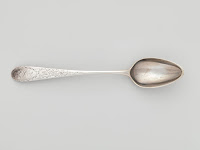Ordinary Objects
“Question your tea spoons,” French author Georges Perec encourages in his 1973 essay “Approaches to What?” “The daily papers talk of everything except the daily. […] What we need to question is bricks, concrete, glass, our table manners, our utensils, our tools, the way we spend our time, our rhythms. To question that which seems to have ceased forever to astonish us.”
I lead a reading group at West Windsor called “Rule of Three” (you’re invited – https://www.eventkeeper.com/mars/xpages/xp_newpopevent.cfm?zeeOrg=MCL&EventID=7281025&sw=1600). Each month, we read a short story, a poem, and an essay all connected by a theme. In May, our theme was “Ordinary Things.” We read a different essay by Georges Perec: “Notes Concerning the Objects That Are on My Work-Table,” which is just what it sounds like. Some people in the group didn’t connect with the piece, but others found it calming and meditative. For some, in brought to mind cleaning out the house or room of a loved one after they have passed, and wondering at each object, what it meant, and whether it should be kept. If Perec intrigues you, we have his novel Life, A User’s Manual as an eBook in the hoopla app.
Speaking of teaspoons, we also read “Ode to the Spoon” by Pablo Neruda. Neruda is perhaps most famous for his love poems, but he wrote 225 odes throughout his career. We have them all collected in All the Odes. If you’re interested in the ordinary, I highly recommend the collection Odes To Common Things, a bilingual edition with sweet illustrations by Ferris Cook. It contains odes to a pair of socks, a dog, a car, a bar of soap.
Our story of the month was “The Overcoat” by Nikolai Gogol, which Nabokov considered the greatest short story ever written in Russian. It tells the tale of a lowly bureaucrat with the ridiculous name Akakiey Akakievtich Bashmachkin, and his new overcoat, which he scrimps and saves for. After finally getting the coat, it is stolen from him. It’s a tragic and hilarious story, and it ends with fantastical revenge. Akakiey Akakievtich is at once a ridiculous and deeply sympathetic character, disregarded and made fun of by his colleagues and superiors. Someone in my reading group suggested that he is the ordinary object in the story, rather than the coat - which to Akakiey Akakievtich is anything but ordinary.
As the group discussed objects, someone recommended the book At Home: A Short History of Private Life by Bill Bryson. I second this recommendation! It is a delightful book that considers each room in the (English/Western) house and explains the history behind mundane furnishings and gadgets that we use every day without thinking about them much.
Below I’ve gathered a few more histories of objects, in case you’d like more objects to question, write odes to, or be astonished by.
The Phone Book: The Curious History of the Book That Everyone Uses But No One Reads by Ammon Shea
“With his signature combination of humor, curiosity, and passion for combing the dustbins of history, Shea offers readers a guided tour into the surprising, strange, and often hilarious history of the humble phone book. From the first printed version in 1878 (it had fifty listings and no numbers) to the phone book's role in presidential elections, Supreme Court rulings, Senate filibusters, abstract art, subversive poetry, circus sideshows, criminal investigations, mental-health diagnoses, and much more, this surprising volume reveals a rich and colorful story that has never been told-until now.”
Salt: A World History by Mark Kurlansky
“Best-selling author Mark Kurlansky turns his attention to a common household item with a long and intriguing history: salt. The only rock we eat, salt has shaped civilization from the very beginning, and its story is a glittering, often surprising part of the history of humankind. A substance so valuable it served as currency, salt has influenced the establishment of trade routes and cities, provoked and financed wars, secured empires, and inspired revolutions. Populated by colorful characters and filled with an unending series of fascinating details, Salt is a supremely entertaining, multi-layered masterpiece.”
Unmentionables: A Brief History of Underwear by Elaine Benson and John Esten
“Traces the history and evolution of undergarments from prehistoric times to the present.”
About Time: A History of Civilization in Twelve Clocks by David Rooney
“Through the stories of twelve clocks, About Time brings pivotal moments from the past vividly to life. Historian and lifelong clock enthusiast David Rooney takes us from the unveiling of al-Jazari's castle clock in 1206, in present-day Turkey; to the Cape of Good Hope observatory at the southern tip of Africa, where nineteenth-century British government astronomers moved the gears of empire with a time ball and a gun; to the burial of a plutonium clock now sealed beneath a public park in Osaka, where it will keep time for 5,000 years. Rooney shows, through these artifacts, how time has been imagined, politicized, and weaponized over the centuries-and how it might bring peace. Ultimately, he writes, the technical history of horology is only the start of the story. A history of clocks is a history of civilization.”
Cigarette Lighter by Jack Pendarvis
“An eclectic and poetic exploration of the cigarette lighter and its association with romance, magic, art, science, immortality and death in literature and popular culture.”
- by Cornia B., West Windsor Branch






Comments
Post a Comment